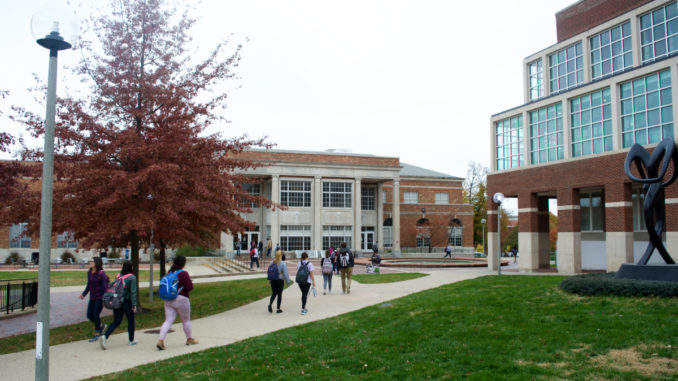
Some Truman State University students have found starting an on-campus organization to be more difficult than anticipated, posing problems for students who wish to start organizations.
The Union and Involvement Services, formerly known as the Center for Student Involvement, is in charge of approving organizations and maintaining the University’s organizational chartering process.
Last year, 14 organizations applied to become official campus organizations and nine were accepted. This semester, seven organizations have applied and are currently going through the hearing and/or chartering processes.
The process to become an organization requires filling out an initial application for the proposed organization and once approved, the organization must go through a hearing with members of the organizational development team, which will lead to an approved organization in the chartering status. While in the chartering status, which takes approximately three weeks, the organization must create a constitution, turn in several pieces of paperwork and meet with the organization’s liaison to be placed under provisional status. After 16 successful weeks under provisional status, the organization will be recommended by its liaison to be a fully accepted, chartered organization or advised to make further changes to its mission or paperwork.
In an effort to start a vegetarian and vegan club on campus, Jimmy Clemens said he faced multiple issues. U&I denied the veggie club because its mission of vegetarian and vegan advocacy was thought to pose a health risk to students, Clemens said.
“The mission that our group was trying to do would be posing too much of a health risk on other students and for that reason, they turned us down,” Clemens said.
Clemens said the veggie club was told during their hearing that recommending a change in lifestyle or diet without a certified nutritionist was out of the realm of what an organization could do.
There are many clubs and organizations on campus that advocate lifestyle changes for students, Clemens said. Clemens said he thought it was unfair to deny his organization for its mission statement, but allow others to operate that are also advocating changes that could hypothetically cause health or physical risks, such as the Environmental Campus Organization.
“I definitely understood where the University was coming from and I felt they had every right because yeah, we were advocating a change for diet,” Clemens said. “However, there were still other groups doing similar changes, so I still thought they were reasonable but definitely unfair.”
Clemens said he knew of many other students that tried to start organizations on campus but failed to be accepted for various reasons. A friend of Clemens attempted to start a “figure out your major” club, which got denied because of University academic advisers being the main resource for those services, Clemens said.
The Roundnet Club is a new effort on campus by Zac Dwyer and his friends to play Spikeball with other groups of people.
“To play a game, you have to have four people and it’s not the easiest to always find four people whenever you want to, so that was a big reason why we started,” Dwyer said.
Overall, Dwyer found that while U&I were helpful in times of need, the process to become an organization took a long time and also required a lot of paperwork.
“I heard when I came here for visit day. They said it was super easy to start an organization, and I don’t know if it’s super easy,” Dwyer said. “There is a whole lot more paperwork that has to go through like you have to write up a whole constitution … it just takes a little bit.”
U&I has received complaints in the past on the process of starting a new student organization, Laura Bates, director of the student union and campus activities, said. Bates said no process is perfect and the U&I is constantly looking to improve its services.
Bates said the U&I never discriminates or denies an organization based on personal opinion but looks at how prepared the organization is and its steps to mitigate risk.
“Similar to First Amendment free speech, we don’t judge on content. We’re looking at other things,” Bates said. “Just because we accept someone for chartering doesn’t mean necessarily that we as individual people respond to those ideals, but it doesn’t mean that they should not be able to be represented in the community.”
Savanna Ott, a member of the U&I organizational development team, said there are two main reasons an organization can be denied: being unprepared and not having thought out the sustainability of their organization, and not establishing the overall effectiveness of the organization.
Ott said clubs might also be denied if they think that a similar organization or club already exists on campus. U&I encourages the proposed club to work with the already existing organization.
“We don’t place a restriction on [the number of organizations] in any way shape or form,” Bates said. “Now, we are conscious of [the] people power that we have in order to work with groups, but ultimately if the chartering group and hearing board believe they should move forward, then it’s accepted.”
